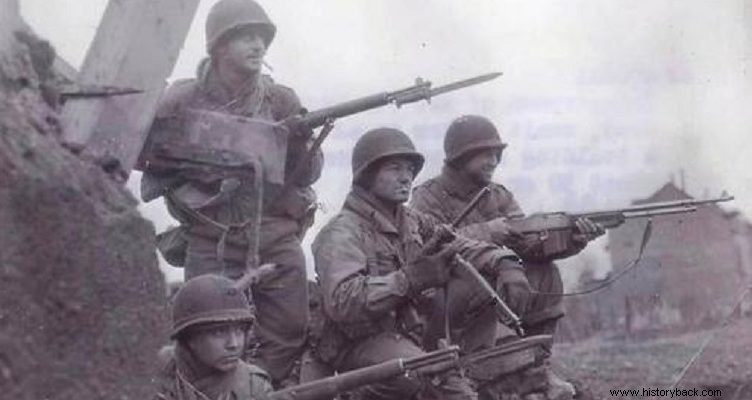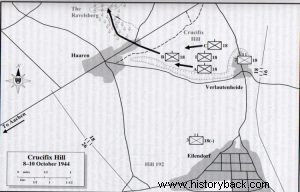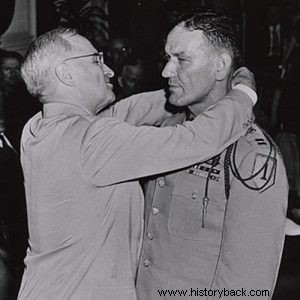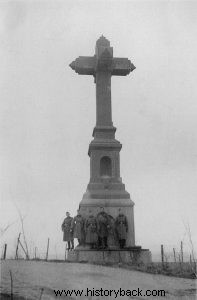
Robert “Bobby” Evan Brown was a special case of an officer. Born in 1903, he enlisted in the army in 1918 aged just 15, falsely claiming to be 18. He did not get to fight in World War I, but managed to become a hero in World War II.
When the US got involved in WWII Brown was on duty in the 2nd Armored Division. In 1943 he was promoted to second lieutenant and assigned to the 1st Infantry Division (MP). He was trained in all weapons of the US Army and was an excellent boxer participating in the army team. During the Normandy landings he was a platoon leader of C Company on Omaha Beach. When the company commander was killed he assumed command. He went on to command C Company during the advance into Germany.
The Hill of the Cross
On October 8, 1944 the battle for Aachen had begun. However, there was a serious obstacle to the encirclement of the city, hill 239, or Hill of the Cross, as it was called, from a large cross on the top.
The attack against the hill was undertaken by the 18th Infantry Regiment of the 1st MP, which sent the I/18th Battalion as the first echelon. Leading the battalion was Brown's C Company who had meanwhile been promoted to captain.
At 04.00 on the morning of 8 October 1944 the company moved out. His battalion mission was tantamount to suicide as the Germans had set up at least 43 machine guns and artillery on the hill. Brown's company had to capture six artillery pieces, 17, 18, 19, 20, 26, 29 and 30.
After being preceded by an air raid, Brown led his company forward reaching the cemetery at the foot of the hill. The company arrived and took cover in an anti-tank ditch in front of gun emplacement 18. But there the company was pinned down. Then Brown called out to his first platoon sergeant:"Get me two flamethrowers and some explosive charges." After ordering a base of fire to be established, Brown, with an explosive charge in hand, began to crawl toward the machine gun.
Taking advantage of the craters in the ground from the bombing he approached and dropped an explosive charge inside. The machine gun disappeared in a cloud of smoke with flames flying high. Immediately afterwards Brown returned to his men's positions, took a second explosive charge and a Bangalore torpedo and after reaching the damaged machine gun 18, moved a further 35 m to machine gun 19, although the German machine guns had spotted him and were firing at him.
Mortar shells exploded next to him forcing him to "pin" to the ground. Finally he managed to get close. With the Banglore torpedo he blew a hole in the wall of the gun through which he dropped the explosive charge, shaking it into the air.
Brown returned to his men again. Then he saw his knee full of blood. There a sergeant shouted to him:"Sir there are bullet holes in your water tank." Nevertheless, although wounded, Brown, after stocking up on explosives, set off for gunnery - machine gun 20. The fort had an 88mm gun. and at least six machine guns. He had a guard of 45 men. Its walls were 1.8 m thick.
Moving through a communication trench he covered the 20 m that separated the destroyed machine gun 19 from Fort 20. There he got lucky. A German soldier approached carrying ammunition. In order for him to enter, the defenders inside the fortification opened the steel door. Brown, of course, did not let the opportunity go to waste and in a fraction of a second threw in two explosive charges.
The fortification with all the Germans in it was pulverized. The destruction of Fortification 20 opened the way for the I/18th Battalion to capture the hill of Estavromenos. From the breach created by Brown, his colleagues took over the hill. He himself, although wounded, refused to leave until the hill was occupied. The Germans counterattacked to recapture the hill with two regiments but were repulsed.
Inglorious ending
Brown was wounded again, shortly afterwards, again in the Aachen area, very seriously, this time and stayed in the hospital for months. He returned to action in the final days of the war in Czechoslovakia. Brown was awarded the Medal of Honor, America's highest award, by US President Truman.
He retired in 1952 with the rank of captain. He spent the next two years in hospitals as his 13 total injuries plagued him. Unable to find work, he accepted the position of janitor at the military academy at West Point. However, his psychology had taken a heavy toll and on November 8, 1971, he committed suicide.



